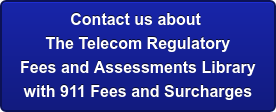 The Regulatory Mix, TMI’s daily blog of telecom related regulatory activities, is a snapshot of PUC, FCC, legislative, and occasionally court issues that our regulatory monitoring team uncovers each day. Depending on their significance, some items may be the subject of a TMI Briefing.
The Regulatory Mix, TMI’s daily blog of telecom related regulatory activities, is a snapshot of PUC, FCC, legislative, and occasionally court issues that our regulatory monitoring team uncovers each day. Depending on their significance, some items may be the subject of a TMI Briefing.
FCC Public Safety and Homeland Security Bureau
EAS
The FCC’s Public Safety and Homeland Security Bureau has reminded all Emergency Alert System (EAS) Participants that: (1) they are required to participate in a nationwide test of the EAS that is scheduled for September 28, 2016, at 2:20 pm EDT; (2) they must register with the EAS Test Reporting System (ETRS) and file Form One on or before August 26, 2016; and (3) file ETRS Form Two at or before September 28, 2016, and Form Three on or before November 14, 2016. The Bureau also announced the release of a revised EAS Operating Handbook. A copy of the Handbook is attached to the Public Notice and must be located at normal duty positions or EAS equipment locations when an operator is required to be on duty and be immediately available to staff responsible for administering EAS tests.
911 Reliability Certifications
The FCC’s Public Safety and Homeland Security Bureau also announced that the FCC’s online system for filing 911 reliability certifications has been reopened for filing the Annual Reliability Certification, due October 15, 2016. Covered 911 Service Providers that wish to begin submitting information for the Annual Reliability Certification may now do so through the online portal. The Commission’s rules require Covered 911 Service Providers to take reasonable measures to provide reliable 911 service with respect to three substantive requirements: (i) 911 circuit diversity; (ii) central office backup power; and (iii) diverse network monitoring. Covered 911 Service Providers are required to file annual certifications of compliance with specified best practices or reasonable alternative measures. The initial certifications were filed in October 15, 2015, certifying as to substantial progress towards each of the three substantive certification requirements. Through the 2015 certification process, 220 companies filed Initial Reliability Certifications. TMI Briefing Service subscribers see Briefings dated 1/2/14 and 11/20/14.
California Service Quality Rules
The PUC adopted service quality rules that will, among other things, impose automatic fines for failure to meet three service quality measures: 1) Out-of-Service Repair Interval, 2) Customer Trouble Reports, and 3) Answer Time for Trouble Reports and Billing and Non-billing Inquiries. Fines accrue when a company fails to meet prescribed standards for three consecutive months. The service quality rules apply to companies who provide traditional landline service (POTS), as well as those companies who offer California LifeLine. Watch for details in a TMI Briefing when the order is released.
TMI's Fall 2016 Telecom Regulatory Seminar & Workshop October 18 - 19 in Maitland, FL





